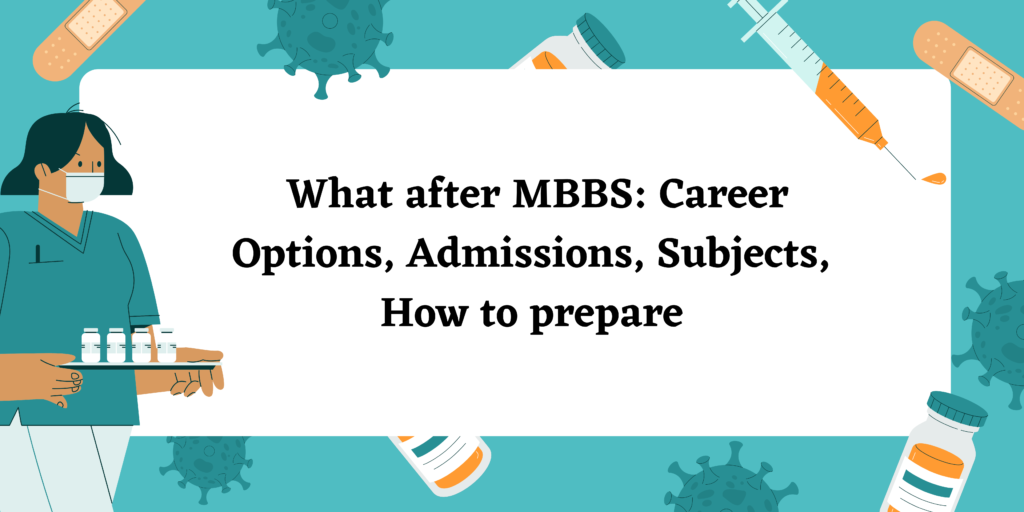What after MBBS??? – Course Syllabus, Career Options, Skills Required etc.

Medical aspirants who aim to become doctors, take admission to medical colleges for completing their undergraduate course, i.e., the MBBS (Bachelor of Medicine and Bachelor of Surgery). But what after MBBS? Should I opt for Postgraduate Courses or go for some other career options? This blog will answer all your queries.
But before, we head to the main topic, we must know a little bit about MBBS. It is a 5.5-year course, including a year of rotational internships at various health care centres. MBBS degree holders are allowed to select a specialization for further studies in practising medicine. This can be Gynecology, Endocrine, General Surgery, Nephrology, Cardiology, Anesthesiology, and others. Let us see more details about the focus needed by MBBS aspirants to focus on joining the MBBS course, and what they can do after that.
Entrance exams for admission to MBBS
The NEET or National Eligibility cum Entrance Test has to be cleared by aspirants to get admission into a medical course. The government, as well as private medical institutions, accept students based on their NEET scores. Strictly following the syllabus, and practising questions from the latest exam pattern consistently, can help candidates emerge victorious in spite of the cutthroat competition.
Skills and traits that candidates should have for pursuing MBBS course
- Hardworking
- Resilient
- Quick thinking
- Professionalism
- Communication skills
- Ability to think fast
- Leadership skills
- Team working skills
- Higher emotional intelligence
Process of admission to the MBBS course in India through NEET-UG
The admission process of MBBS is quite easy. The National Testing Agency is responsible for MBBS Admission. The applicant has to meet the eligibility criteria before applying. The first stage of the admission process is to fill and submit the application form. If the form is approved, then the candidate gets an admit card, to appear in the exam.
After the completion of the exam, the NTA announces the result. Hence, based on the merit scores and results, counselling takes place. In the counselling session, the candidates are offered seats in Government, Private Medical Colleges.
Scholarships available for MBBS Students
There are a number of scholarships for MBBS students to relieve financial pressure regarding the payment of fees while pursuing the course.
Top universities in India offering MBBS courses
Here is the list of renowned universities in India offering the MBBS program:
- All India Institute of Medical Sciences
- Armed Forces Medical College
- Jawaharlal Institute of Post Graduate Medical Education and Research
- Christian Medical College
- Maulana Azad Medical College in New Delhi
- King George’s Medical University in Lucknow
Overview of subjects covered in MBBS course
The MBBS course helps medical aspirants learn about healthcare, and the medical industry in detail, besides ethical practices, so that at the end of the course, they can easily get into hospitals as doctors or volunteer projects. There are over 19 subjects in the MBBS Course. Below you can find an overview of the subjects included in the course.
However, if you are preparing for NEET PG during your MBBS, then check our eGurukul Packages to enrol now. These plans will not only, excel you in NEET PG, but also will help you to secure good marks in the university exams.
- Anatomy
- Dermatology & Venereology
- Biochemistry
- Medicine
- Physiology
- Obstetrics & Gynecology
- Forensic Medicine & Toxicology
- Ophthalmology
- Microbiology
- Orthopaedics
- Pathology
- Otorhinolaryngology
- Pharmacology
- Paediatrics
- Anesthesiology
- Psychiatry
- Community Medicine
- Surgery
Phase-wise structure of the MBBS course
The MBBS course comprises of three phases, with some semesters in each, as explained below –
Pre-clinical phase
This phase has two semesters dedicated to it, and includes the following subjects:
- Anatomy
- Biochemistry
- Physiology
Para-clinical phase
This phase has three semesters dedicated to it, and includes the following subjects:
- Community Medicine
- Pharmacology
- Microbiology
- Pathology
- Forensic medicine
- Clinical posting of candidates in OPD and wards
Clinical phase
This phase has four semesters dedicated to it, and includes the following subjects:
- Community medicine
- Obstetrics Gynae
- Pediatric surgery and allied subjects i.e Anesthesiology.
- ENT, Orthopedics, and Ophthalmology
- Clinical postings
Year-wise syllabus for MBBS course:
First-year: Please see below the subjects and chapters –
a. Anatomy:
- Microanatomy
- Embryology and Genetics
- Gross anatomy
- Neuroanatomy.
ii. Biochemistry:
- Molecular Biology
- Biological cell
- Hormones
- Metabolic pathways
- Enzymes
- Cancer and cancer makers
- Biomolecules
- Food assimilation and nutrition.
iii. Physiology:
- Respiratory System
- Gastrointestinal System
- Nutrition
- General Physiology
- Kidney
- Nerve–Muscle
- Neurophysiology
- Blood
- Environmental Physiology
- Cardiovascular System
- Nutrition
- Yoga
Second-year: Please see below the subjects and chapters
a. Community Medicine:
- Infestations
- Infective dermatoses
- Ineffective dermatoses
- Drug eruptions
- Allergic disorders
- Allergic disorders
- Melanin synthesis
- Vesiculo-bullous diseases urticaria
- Epidermopoiesis
- Erythema multiforme
- Pathogenesis
- Psoriasis
- Dermatological Emergencies
- Gonococcal and Nongonococcal infections
- HIV infection.
b.Pharmacology:
- Central nervous system
- General Pharmacology
- Autacoids
- Autonomic nervous system & The peripheral nervous system
- Gastrointestinal and respiratory system
- Cardiovascular system
- Chemotherapy
- Hormones
- Miscellaneous
c.Pathology:
- Systemic Pathology
- General Pathology
- Practical.
d. Microbiology: It includes:
- Bacteriology
- Microbiology
- Virology
- Bacterial Staining and Cultivation
- Laboratory Diagnosis of Viral Infection
- Common Tests for Bacterial identification
- Mycology
- Parasitology
- Common Laboratory Methods for Diagnosis of Fungal Infections Bacterial, and Viral Genetics
- Vaccines
- Host-Parasite relationship
- Collection of Transport of Samples
- Microorganisms associated with gastrointestinal infections Immunodiagnosis
- Sterilization and disinfection
- Gastrointestinal infections are caused by parasites.
e. Forensic Medicine and Toxicology: It includes:
- Toxicology
- Forensic Medicine.
f. Clinical postings inwards:
In this, the students are allowed 12 weeks of clinical posting for serving in the field of community medicine.
g.Outpatient Department (OPD):
A place in the hospital with medical facilities, physical facilities, and concerned staff. There are scheduled timings for all medical activities taking place here. The OPD is meant for looking after patients who have not been registered as inpatients.
Third-year: Please see below the subjects and chapters
a. Community Medicine:
It deals with a community’s overall health system and is often taught at Primary healthcare centres.
b. Otolaryngology or ENT(Ear, Nose and Throat):
This involves treating the ear, nose, throat, head, and neck issues in the human body.
c. Ophthalmology:
It deals with diagnosing and treating issues related to the eyes.
Fourth-year: Please see below the subjects and chapters
a. Psychiatry:
- Emotion and its application to health
- Psychiatric disorders
- Behavioural Sciences
- Personality disorders
- Cognitive process and memory
- Schizophrenia
- Anxiety neurosis
- Bipolar disorders
- Depression
- Phobia
- OCD Head.
b. Dermatology and Venereology:
- Health Education
- Environment
- Behavioral Sciences
- Nutrition
- Biostatistics
- Rehabilitation
- Epidemiology
- Important National Health Programs
- Health Administration
- Epidemiology of Communicable Diseases And Non-communicable Diseases
- Counselling Maternal & Child Health
- Geriatrics
- Health Economics.
c. Pediatrics:
- Growth and development
- Respiratory system
- Vital statistics
- Nutrition
- Infectious diseases
- Immunization
- Haematology
- Gastro-Intestinal Tract, Cardiovascular system
- Central Nervous System, Behavioral Problems
- Neonatology
- Fluid-Electrolyte
- Paediatrics Emergencies
- Genetics
- Fluid-Electrolyte
- Therapeutics
- Genito-Urinary System
- Pediatrics Surgical Problems.
d. Anesthesiology:
- Cannulation
- Preoperative evaluation & optimization
- Nasopharyngeal or Oropharyngeal Airway insertion
- Skills learned: Attaching pulse oximeter, bag-Mask Ventilation, BP cuff and ECG electrodes, and setting up a monitor.
e. Orthopedics:
- Orthopedic Oncology
- Orthopaedic Neurology
- Pediatric orthopaedics
- Sports Medicine
- Management of Trauma
- Physical Medicine and Rehabilitation
- Radiology
- Disorders of Spine
- Fracture.
f. Obstetrics and Gynecology:
- Obstetrics
- Gynecology
- Basic Sciences
- Neonatology
- Recent Advances
- Contraception.
Rotary internship in MBBS course
This is a crucial part of the MBBS program. All candidates must complete the 1-year rotary internship. This gives them hands-on experience about the way in which things function in their field, during this 1 year. Learning about maintaining interpersonal relations with patients is also part of the internship. For each candidate, a logbook is maintained to track activities. Also, the postings are changed regularly. Click here to read more about MBBS Internship.
What after MBBS? Career Opportunities
Once the MBBS course is completed successfully, candidates can get amazing opportunities in India and abroad. Candidates may get to work with medical colleges, health centres, laboratories, biomedical firms, hospitals, nursing homes, pharmaceutical, and biotechnology firms. Salaries across various roles, start from INR 3-4 lakhs per annum and gradually increase with experience. Also, an aspirant can pursue higher education after MBBS. However, he/ she has to appear and qualify for NEET PG. Let’s take a look at top recruiters for MBBS graduates.
Mostly, students with MBBS degrees get recruited into some of the country’s top Hospitals, Pharmaceuticals and Medical Research Centres. MBBS recruiters include:
- Sun Pharmaceutical Industries Ltd
- Lilavati Hospital and Research Centre
- Wockhardt Ltd
- Max Health Care
- Indraprastha Apollo Hospitals
- Care Hospitals
- Apollo Munich Health Industries Co Ltd
- Religare Health Insurance Company Ltd
- All India Institute of Medical Sciences
- Dr. Lal Path Labs
- Sri Ganga Ram Hospital
- Postgraduate Institute of Medical Education and Research
- Medanta Hospitals
- Fortis Healthcare Ltd
- Global Hospitals
- Apollo Hospitals Enterprises Ltd
- Cipla Ltd
Career Opportunities after MBBS
Professors and lecturers in medical colleges, researchers, scientists, are alternate roles available to MBBS candidates. The most common roles are as follows –
- Higher studies after the MBBS UG, candidates can appear in NEET PG.
- General physician
- Paediatrician
- Medical Surgeon
- Dietician
- Government job opportunities
- Indian Railways
- Indian Army
- Master of Surgery
- Doctorate of Medicine
Conclusion
MBBS is one of the most reputed courses in India, as well as other countries, as candidates aim to serve mankind through the selfless service of becoming doctors. It is important for those intending to pursue the course, to know what to expect, and what is the scope of the MBBS. This makes the roadmap ahead clear and helps candidates focus better, and achieve desired results. Find out more about the MBBS course, on our DBMCI website.


